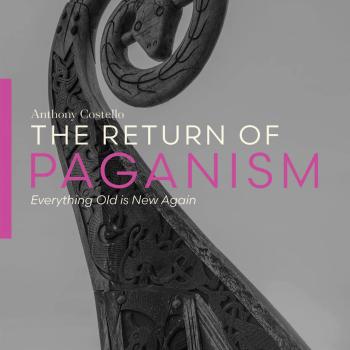In my last post, I discussed what I believe to be the theological view of the group know as #HeGetsUs. Or, if this is not their view, they are at least presenting themselves in this way. Based on the Super Bowl commercials they have aired over the last two years, and their stated mission, it seems justified to categorize those involved with #HeGetsUs as “Culture Christians,” or, in Richard Niebuhr’s terminology, “Christ-of-Culture” Christians. In lieu of this approach to culture, I will argue that one inevitable result of the view is an inadequate, or distorted, presentation of Jesus Christ to the world. In short, Christ-of-Culture Christians convey a Gospel that is analogous to political propaganda, as opposed to a genuine assertion or claim to Truth. But first, we have to discuss the type of secular propaganda these Christians are reacting to (in kind).
Some Evidence That #HeGetsUs Doesn’t Get It
One blogger, Clare de Graaf, who claims to know the creator of the Footwashing Ad, Bill McKendry , a Christian Marketing expert (if that is even a coherent idea), writes this about the motivation for the multimillion-dollar Ad:
Whether we like to hear it or not, in survey after survey even by Christian pollsters, non-Christians believe Christians are against more things than they are for. We are perceived as anti-gay, anti-science, anti-vaccination, anti-education, ant-immigration and we want to shut down every library that offers books that are contrary to the Bible. I’m sure you don’t agree with those observations but it doesn’t matter. Many in the public do so we have a problem.
https://www.claredegraaf.com/post/he-gets-us-super-bowl-ads
There are some disconcerting things about what de Graaf says here. First, is the claim that non-Christians believe “Christians are against more things than they are for.” The problem is not that this claim is dubious, it may very well be the case that people think this way. The real problem with this statement, however, is twofold.
First, there is no serious consideration given as to why non-Christians perceive Christians as only against things. The assumption by people like de Graaf and McKendry seems to be that it is because it is true, not because it may be a narrative that non-Christians themselves have consistently promoted, in spite of what the actual facts of the matter may be.
After all, how does one even gauge statistically what people are “for?” Not only are most poll questions vague and unable to capture doxastic nuance, but there is a simple linguistic trick being played here. For example, what is the person who is against abortion: is she “anti” abortion, or is she a “pro” life? Is she against women, or for pregnant mothers? The same goes for the transperson. If I am against someone transitioning, is that not actually being for them, especially taking into account the physical and psychological damage known to accompany transitioning?
If Christianity is true, then indeed it is being for the trans-identifying person, and not against them, to try to stop them from transitioning. Again, if a question is asked about what one believes on the issue of unborn life, and one says “I am against abortion,” is that simply registered as an “against” belief? But why? Why is it not also registered as a “pro” belief? In the end, these are all just rhetorical tactics, ones employed with propagandistic intentions and purely political ends. The list that de Graaf provides is even reminiscent of Hilary’s Clinton’s famous screed against “deplorables” during her presidential run, just with “anti-vax” now thrown in. This is a naive acquiescence and response to a fabricated, political narrative.
Thus, de Graaf’s statement suggests a credulity on the part of the Ad’s creator, who appears old enough to be aware of the long-standing attempt by the media-entertainment complex to forge a demoralization campaign against Christianity, both in its Protestant and Roman Catholic forms. Further, in addition to the use of language, consider when was the last time you saw a movie or TV show (not one made by the Kendrick brothers, of course) that portrayed an Evangelical pastor or Roman Catholic priest in a positive light? You’ll have to go back quite a way to find a good example.
Discerning Cultural Propaganda
In the future, I would suggest marketing gurus like McKendry read books by those who have devised concrete political and social strategies to undermine the image of Christianity in the culture. One place to start might be Saul Alinksy’s Rules for Radicals, which lays out his “ethics of means and ends,” an ethic which betrays an absolute political pragmatism.
Here are just two of Alinsky’s maxims for the producers, funders and creators of #HeGetsUs to ponder before their next Super Bowl endeavor:
The second rule of the ethics of means and ends is that the judgement of the ethics of means and ends is dependent upon the political position of those sitting in judgement.
Saul Alinsky, Rules for Radicals, 26
And
The tenth rule of the ethics of means and ends is that you do what you can with what you have and clothe it with moral garments.
Alinksy, Rules, 36
Couple these rules that encourage the use of moralizing language to convince those sitting in judgment over your position (here Christians, a sizable voting bloc) with two of Alinsky’s tactics and you can see the entire roadmap for demoralizing a cultural enemy:
The fourth rule [tactic] is: Make the enemy live up to their own book of rules. You can kill them with this, for they can no more obey their own rules than the Christian church can live up to Christianity.
The fourth rule carries with it the fifth rule: Ridicule is man’s most potent weapon. It is almost impossible to counterattack ridicule. Also it infuriates the opposition, who then react to your advantage.
Alinksy, 128
In sum, were Christians discerning, “like a serpent” (Matt 10:16), we might recognize to what extent we have been played by political strategists. Christians have been conditioned to see themselves in this negative light: as people who have nothing positive to offer society, as grumblers, complainers and, put simply, as mean-spirited, hypocritical bitches. But this is neither a novel nor obscure campaign against Christianity. It has been carried out for decades in America, and even long before that. The Roman historian Tacitus employed similar rhetoric in his own day when he implied that Nero’s gratuitous persecution of Christians was partially justified due to Christians’ “hatred of mankind.” Is this very different from being called “a hater” today?
Second, however, is de Graaf’s assumption that there is something wrong with being against things. As if this is the crux of Christianity’s image problem. I have unfortunately heard anodyne statements like this from many well-meaning Christians for years: “we want to be known for what we are for, not what we are against!” Still, as I pointed out above, what we are against not only implies what we are for, but what were are against also defines us as believers in Christ.
Christ himself was against quite a many things, and, last time I checked, so was His Father. Do these “what we are for, not against” Christians read the Old Testament? Are they familiar with the strictures of the Law that, regardless of how impossible to fulfill, both Jesus and Paul called “good?”
Even Freud understood that what one restricts or limits in society, and in one’s own personal life, is what gives birth to a healthy culture, or organism. Being against life-destructive or deterring practices and behaviors: abortion, same-sex marriage, transgenderism, crime (!), is not wrong. In fact, it is supremely right! Unfortunately, the fact Christians think and talk in this manner shows to what extent secular propaganda has diminished our critical thinking capacities.
To conclude this point, not only is it dubious how the secular culture came to believe Christians are only “against” things and not “for” things, it is a sign of the depth and scope of indoctrination that people see being against things as negative. After all, in the Bible, it is the tolerance of sin in the community that is abominable to the Lord. But to be intolerant is inherently about what one is against. Being for Jesus entails being against much of the world.
#HeGetUs and Poor Ecclesiology
In his apologetic, de Graaf goes on to pull what has become a common move among progressive Christians, namely, throwing the Church (that’s you by the way) under the proverbial bus so as to highlight this version of the cultural Christ:
Here’s the good news! Jesus still has a far better reputation than his followers! So, McKendry’s idea was to remind people that Jesus was a revolutionary. His #1 command was to love God. But #2 was “love your neighbor as yourself.” And in our current political and cultural climate loving your neighbor appears to be in short supply. So let’s remind people that Jesus himself was for more things than he was against! And he wasn’t just for “things” he was for people. And in particular he was for “the least of these.”
https://www.claredegraaf.com/post/he-gets-us-super-bowl-ads
While it is true that the Church can never be conflated with Christ, even though we are called “the body of Christ,” it is also the case that the Church is the vehicle of Christ on earth. And while we recognize that the treasure of the Gospel is mediated by broken vessels (2 Cor 4:7), and while we acknowledge that evil must be exposed within the Church (Eph 5:11), the persistent libel and slander against the Church by Christians seems a very incautious response to cultural propaganda. Not only does it reinforce the very claim of the skeptic that the Church is a bad place to be, or people to be a part of, but it undermines the doctrine of sanctification, the power and work of the Holy Spirit, as well as the doctrine of election. Thus, people should take care about being overly critical of the Body of Christ. Fair-minded and accurate, yes, but let’s not exaggerate the defects of God’s people, who Christ did, after all, die for.
Further, de Graaf makes a fundamental theological error, for the order of Christ’s teaching here matters. First one must love God so that one can properly love one’s neighbor. I have never met a nonbeliever who felt they needed Jesus to help them be kinder or more loving. I certainly didn’t think that before my conversion! The thing is we can love people without Jesus, even quite powerfully. However, even then, we are not loving them properly, because we are not first loving the One who is Love, and thereby defines it for us, namely, God. Space does not permit a fuller explanation of the doctrine of divine love, but what uninformed responses like these do is assume that the second of Jesus commands can be fulfilled apart from the first. This is a problem.
Finally, yes, Jesus is clearly better than His followers. This follows from any orthodox Christology and ecclesiology. However, this lowly view of the Church as the Lord’s chosen people tends to reduce the metaphysical reality of the Church as Christ’s Body: adopted, sealed by the Spirt and made for glory. Instead, the Church is presented as little more than a social or religious club that people might want to consider joining if they find Jesus interesting. But, even then, they don’t have to. This is hardly an orthodox or historical view of the nature of the Church.
#HeGetsUs is Not Pre-Evangelism, It is Evangelism
In defense of #HeGetsUs many Christians like de Graaf, as well as Evangelical “thought leader,” Ed Stetzer, have suggested conservative Christians need to relax about the Ad. They argue that #HeGetsUs is only “pre-evangelism” and not full-on evangelism. According to Stetzer, one cannot present “creation, fall, redemption” in just 60 seconds. I actually think that one could do this, and do it creatively. But, even if one could not, it is not clear why the Ad that was made was made the way it was.
Here is de Graaf:
Critics complain that the Jesus in the ads never talks about sin, the cross, or repentance. But these ads are not meant to be evangelistic. They are pre-evangelistic- which is having discussions that prepare people to hear the gospel.
This is a strange view of evangelism that both de Graaf and Stetzer are suggesting. It seems that once you start hash-tagging Jesus’ name, making claims about what He taught and using explicitly biblical imagery, you are not doing “pre” evangelism, you are just doing evangelism. The dividing line between the two may be vague, but historically speaking it has usually been understood that appeals to general revelation and common grace, i.e., doing natural theology, is what would fall under “pre-evangelism” or “setting the conditions” for evangelism. On the other hand, appeals to special revelation, i.e., the Person of Jesus or the Bible, are just evangelism proper.
As such, I do wonder about the theological and historical understanding of those involved with or defending #HeGetsUs. To me, being trained in theology, the #HeGetsUs crowd seems to be constituted mainly of marketing gurus, entertainment and media experts and businessmen. One can only say to this: “Neil Postman, pray for us!” But seriously, the credentials of people who may have good intentions, and clearly have good finances, should matter to those who care about Evangelism and a right and true presentation of the Gospel of Jesus Christ.
In the next part of this series, I will discuss the central problem of this type of “evangelism,” which is that it inevitably becomes a type of propaganda of its own: a Christian Propaganda. I will further argue that given the words of Jesus himself, “let your ‘yes’ be ‘yes’ and your ‘no’ be ‘no’ for everything else cometh of evil,” (Matt 5:37) that Christians should not be in the business of “marketing” Jesus. Instead we should be in the business of doing what Jesus did, namely, being about His Father’s business.














